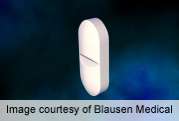(HealthDay)—For patients with gastroesophageal reflux disease (GERD), those who receive a proton pump inhibitor (PPI) prescription from gastroenterologists are more likely to be optimal users and have better symptom control, according to a study published in the June issue of the American Journal of Gastroenterology.
Imran Sheikh, M.D., from Case Western Reserve University in Cleveland, and colleagues surveyed 1,959 patients with GERD at five clinics to assess dosing patterns and symptom control in over-the-counter (OTC) and prescription PPI users. Participants were surveyed regarding GERD diagnosis, use of PPIs, information on dosing, demographics, and Gastroesophageal Reflux Disease Symptom Assessment Scale (GSAS).
The researchers found that 31 percent of participants used PPIs for GERD. Of these, 32 percent purchased OTC PPIs, while 31 and 37 percent, respectively, received prescriptions from gastroenterologists and primary care physicians. Optimal use was reported by 71 percent of those prescribed PPIs by gastroenterologists, compared with 47 percent of those receiving prescriptions from primary care providers and 39 percent of consumers (both P < 0.001). Patients prescribed PPIs by gastroenterologists had significant better GSAS symptom, frequency, and severity scores (all P < 0.001, compared with primary care provider and consumer). Patients using PPIs optimally had significantly better GSAS symptom, frequency, and severity scores, compared with those taking PPIs suboptimally or excessively (all parameters, P < 0.001).
"Patients receiving prescription PPI from a gastroenterologist are more likely to be optimal users with better symptom control," the authors write.
More information:
Abstract
Full Text (subscription or payment may be required)
Journal information: American Journal of Gastroenterology
Copyright © 2014 HealthDay. All rights reserved.





















